形容词和副词讲义
- 格式:doc
- 大小:165.50 KB
- 文档页数:15
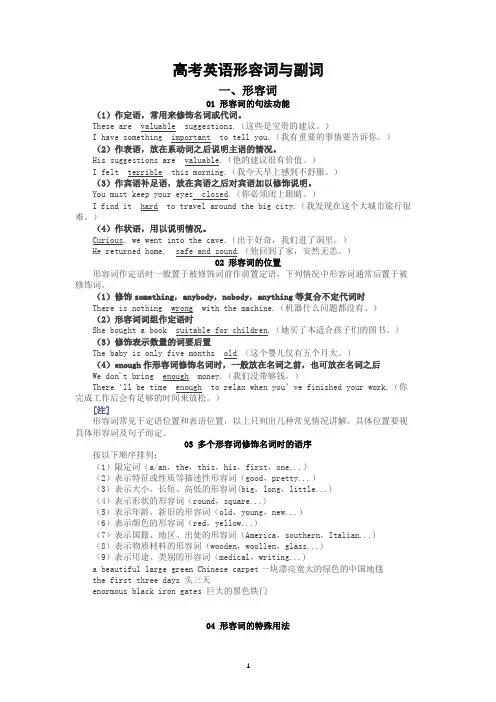
高考英语形容词与副词一、形容词(1)作定语,常用来修饰名词或代词。
These are valuable suggestions.(这些是宝贵的建议。
)I have something important to tell you.(我有重要的事情要告诉你。
)(2)作表语,放在系动词之后说明主语的情况。
His suggestions are valuable.(他的建议很有价值。
)I felt terrible this morning.(我今天早上感到不舒服。
)(3)作宾语补足语,放在宾语之后对宾语加以修饰说明。
You must keep your eyes closed.(你必须闭上眼睛。
)I find it hard to travel around the big city.(我发现在这个大城市旅行很难。
)(4)作状语,用以说明情况。
Curious, we went into the cave.(出于好奇,我们进了洞里。
)He returned home, safe and sound.(他回到了家,安然无恙。
)形容词作定语时一般置于被修饰词前作前置定语,下列情况中形容词通常后置于被修饰词。
(1)修饰something,anybody,nobody,anything等复合不定代词时There is nothing wrong with the machine.(机器什么问题都没有。
)(2)形容词词组作定语时She bought a book suitable for children.(她买了本适合孩子们的图书。
)(3)修饰表示数量的词要后置The baby is only five months old.(这个婴儿仅有五个月大。
)(4)enough作形容词修饰名词时,一般放在名词之前,也可放在名词之后We don't bring enough money.(我们没带够钱。
)There‘ll be time enough to relax when you’ve finished your work.(你完成工作后会有足够的时间来放松。

形容词副词定义:中文的意思是“……的”的词是形容词,用来修饰名词;中文意思是“……地”的词是副词,用来修饰动词、形容词或副词形容词与副词在句中的位置形容词形容词的比较级在句中的位置名词所有格副词的比较级形容词副词的转换考点清单练习:练习①It is a ____(sun) day.②It is a _____(rain) day.③I think you are a _____(luck) girl.④The teacher said he had _____to tell us.A. anything importantB. important anythingC. something importantD. important something⑤Look !Jack is ____(excite,excited) .⑥I feel ____(happy) every day.⑦The baby is sleeping ,please keep______(quiet,quietly)考点二:形容词的比较级(1)在形容词词尾加上“er”“est”构成比较级、最高级:bright(明亮的)—brighter—brightest broad(广阔的)—broader—broadest cheap(便宜的)—cheaper—cheapest clean(干净的)—cleaner—cleanest clever(聪明的)—cleverer—cleverest cold(寒冷的)—colder—coldestcool(凉的)—cooler—coolest dark(黑暗的)—darker—darkest dear(贵的)—dearer—dearest deep(深的)—deeper—deepestfast(迅速的)—faster—fastest few(少的)—fewer—fewestgreat(伟大的)—greater—greatest hard(困难的,硬的)—harder—hardest high(高的)—higher—highest kind(善良的)—kinder—kindestlight(轻的)—lighter—lightest long(长的)—longer—longestloud(响亮的)—louder—loudest low(低的)—lower—lowestnear(近的)—nearer—nearest new(新的)—newer—newestpoor(穷的)—poorer—poorest quick(快的)—quicker—quickest quiet(安静的)—quieter—quietest rich(富裕的)—richer—richestshort(短的)—shorter—shortest slow(慢的)—slower—slowestsmall(小的)—smaller—smallest smart(聪明的)—smarter—smartest soft(柔软的)—softer—softest strong(强壮的)—stronger—strongest sweet(甜的)—sweeter—sweetest tall(高的)-taller-tallestthick(厚的)—thicker—thickest warm(温暖的)—warmer—warmest weak(弱的)—weaker—weakest young(年轻的)—younger—youngest (2).双写最后一个字母,再加上“er”“est”构成比较级、最高级:big(大的)—bigger—biggest fat(胖的)—fatter—fattesthot(热的)—hotter—hottest red(红的)—redder—reddestsad(伤心的)—sadder—saddest thin(瘦的)—thinner—thinnestwet(湿的)—wetter—wettest mad(疯的)—madder—maddest(3).以不发音的字母e结尾的形容词,加上“r”“st”构成比较级、最高级:able(能干的)—abler—ablest brave(勇敢的)—braver—bravest close(接近的)—closer—closest fine(好的,完美的)—finer—finest large(巨大的)—larger—largest late(迟的)—later—latestnice(好的)—nicer—nicest ripe(成熟的)—riper—ripestrude(粗鲁的)—ruder—rudest safe(安全的)—safer—safeststrange(奇怪的)—stranger—strangest wide(宽广的)—wider—widestwise(睿智的,聪明的)—wiser—wisest white(白的)—whiter—whitest(4).以字母y结尾的形容词,把y改为i,再加上“er”“est”构成比较级、最高级:busy(忙碌的)—busier—busiest dirty(脏的)—dirtier—dirtiestdry(干燥的)—drier—driest early(早的)—earlier—earliesteasy(容易的)—easier—easiest friendly(友好的)—friendlier—friendliest funny(好玩的)—funnier—funniest happy(开心的)—happier—happiest healthy(健康的)—healthier—healthiest heavy(重的)—heavier—heaviesthungry(饿的)—hungrier—hungriest lazy(懒惰的)—lazier—laziestlucky(幸运的)—luckier—luckiest naughty(调皮的)—naughtier—naughtiest noisy(嘈杂的)—noisier—noisiest pretty(美丽的)—prettier—prettiestsilly(傻的)—sillier—silliest spicy(辣的)—spicier—spiciestthirsty(渴的)—thirstier—thirstiest ugly(丑的)—uglier—ugliest(5).双音节、多音节形容词,在单词前面加上“more”“most”构成比较级、最高级:afraid(害怕的)—more afraid—most afraidbeautiful(美丽的)—more beautiful—most beautifulcareful(仔细的)—more careful—most carefulcheerful(开心的)—more cheerful—most cheerfulcrowded(拥挤的)—more crowded—most crowdeddangerous(危险的)—more dangerous—most dangerousdelicious(美味的)—more delicious—most deliciousdifficult(困难的)—more difficult—most difficultexciting(令人兴奋的)—more exciting—most excitingexpensive(昂贵的)—more expensive—most expensivefamous(著名的)—more famous—most famousfrightened(受惊的)—more frightened—most frightenedfrightening(令人害怕的)—more frightening—most frighteninghard-working(勤奋的)—more hard-working—most hard-workinghelpful(有帮助的)—more helpful—most helpfulhonest(诚实的)—more honest—most honestimportant(重要的)—more important—most importantinteresting(有趣的)—more interesting—most interestingpolite(有礼貌的)—more polite—most politeterrible(可怕的)—more terrible—most terribletired(累的)—more tired—most tired(6).不规则变化的形容词:bad(坏的)—worse—worst far(远的)—farther—farthest (far—further—furthest) good(好的)—better—best ill(病的)—worse—worstlittle(少的)—less—least many(多的)—more—most much(多的)—more—most old(年老的)—older—oldest ( old—elder—eldest) well(好的,身体好的)—better—best练习1. Is your friend ____ (young) than you ?2. Shanghai is one of ______ (big) cities in the world.3. Do you think English is _____important than maths。
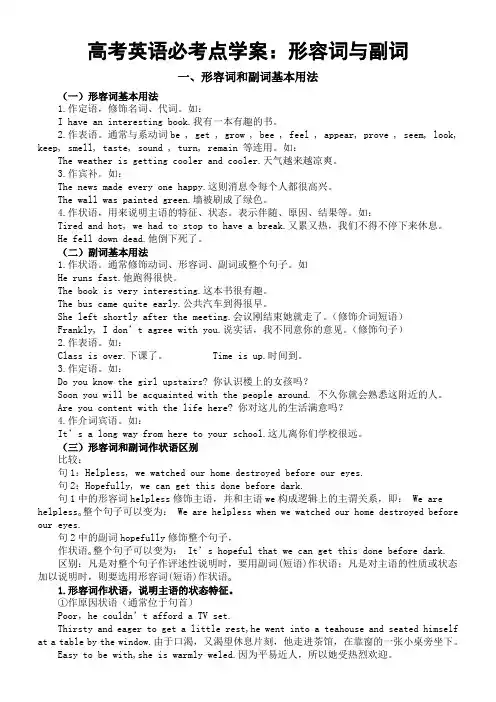
高考英语必考点学案:形容词与副词一、形容词和副词基本用法(一)形容词基本用法1.作定语,修饰名词、代词。
如:I have an interesting book.我有一本有趣的书。
2.作表语。
通常与系动词be , get , grow , bee , feel , appear, prove , seem, look, keep, smell, taste, sound , turn, remain 等连用。
如:The weather is getting cooler and cooler.天气越来越凉爽。
3.作宾补。
如:The news made every one happy.这则消息令每个人都很高兴。
The wall was painted green.墙被刷成了绿色。
4.作状语,用来说明主语的特征、状态。
表示伴随、原因、结果等。
如:Tired and hot, we had to stop to have a break.又累又热,我们不得不停下来休息。
He fell down dead.他倒下死了。
(二)副词基本用法1.作状语。
通常修饰动词、形容词、副词或整个句子。
如He runs fast.他跑得很快。
The book is very interesting.这本书很有趣。
The bus came quite early.公共汽车到得很早。
She left shortly after the meeting.会议刚结束她就走了。
(修饰介词短语)Frankly, I don’t agree with you.说实话,我不同意你的意见。
(修饰句子)2.作表语。
如:Class is over.下课了。
Time is up.时间到。
3.作定语。
如:Do you know the girl upstairs? 你认识楼上的女孩吗?Soon you will be acquainted with the people around. 不久你就会熟悉这附近的人。

形容词与副词讲解导语:语文学习中,形容词和副词是我们常常接触到的词类。
它们在句子中起到修饰名词、动词或其他形容词、副词的作用。
本节课我们将详细讲解形容词和副词的基本概念、用法和注意事项,帮助同学们更好地理解和运用这两个词类。
一、形容词的基本概念和用法1. 形容词的定义:形容词是用来修饰名词或代词的词类,可以描述事物的性质、特征或状态。
2. 形容词的作用:形容词可以用来修饰名词,使句子更加生动、形象。
3. 形容词的用法:(1)形容词可以直接修饰名词,放在名词前面,如:美丽的花朵、高大的建筑。
(2)形容词也可以通过“是”字结构来修饰名词,如:这个房子是新的、那只猫是黑色的。
4. 形容词的变形:形容词有原级、比较级和最高级三种形式:(1)原级:形容词的原始形式,表示事物的一般特征,如:高、大、美丽。
(2)比较级:用于比较两个事物的特征,表示其中一个事物在某一方面的程度更高或更低,如:更高、更大、更美丽。
(3)最高级:用于比较三个或三个以上事物的特征,表示其中一个事物在某一方面的程度最高或最低,如:最高、最大、最美丽。
二、副词的基本概念和用法1. 副词的定义:副词是用来修饰动词、形容词、其他副词或整个句子的词类,可以表示时间、地点、方式、程度等概念。
2. 副词的作用:副词可以使句子更加丰富、准确,增加句子的表达力。
3. 副词的用法:(1)副词可以修饰动词,表示动作的方式、程度等,如:慢慢地走、非常努力地学习。
(2)副词可以修饰形容词,表示形容词的程度,如:非常漂亮、很高兴。
(3)副词可以修饰其他副词,表示副词的程度,如:非常快速地跑、很认真地听。
(4)副词可以修饰整个句子,表示整个句子的态度、语气等,如:幸运地,我们赢得了比赛。
4. 副词的变形:副词有原级、比较级和最高级三种形式,变形规则和形容词相似。
三、形容词和副词的注意事项1. 形容词和副词的区别:形容词主要修饰名词,副词主要修饰动词、形容词或其他副词。
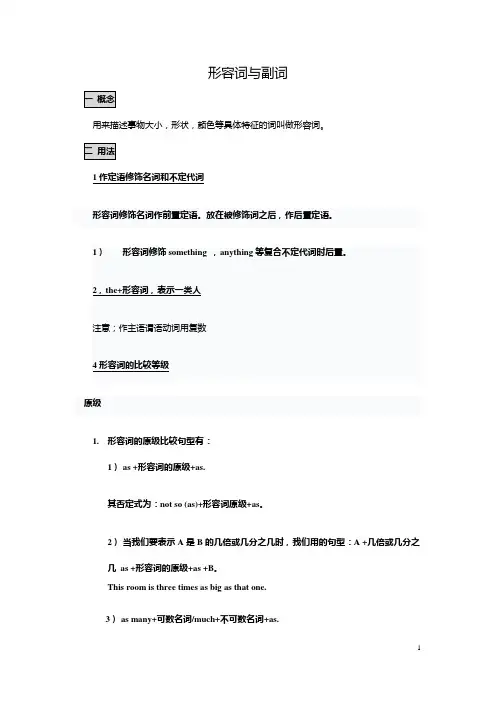
形容词与副词用来描述事物大小,形状,颜色等具体特征的词叫做形容词。
1作定语修饰名词和不定代词形容词修饰名词作前置定语。
放在被修饰词之后,作后置定语。
1)形容词修饰something ,anything等复合不定代词时后置。
2,the+形容词,表示一类人注意;作主语谓语动词用复数4形容词的比较等级原级1.形容词的原级比较句型有:1) as +形容词的原级+as.其否定式为:not so (as)+形容词原级+as。
2)当我们要表示A是B的几倍或几分之几时,我们用的句型:A +几倍或几分之几as +形容词的原级+as +B。
This room is three times as big as that one.3) as many+可数名词/much+不可数名词+as.He earns as much money as his mother does.比较级和最高级大多数形容词的比较级和最高级是采用在词尾加-er和-est的形式,或在单词前加more和most构成。
3)特殊形式的比较级和最高级:英文中有些形容词的比较级和最高级的变化是不规则的。
如:原级比较级最高级good/well better bestbad/ill worse worstfar farther/further farthest/furthestold older/elder oldest/oldestlittle less leastmany/much more mostlate later/latter latest/last※对于上述形容词中有两种不同形式的特殊比较级和最高级用法做一下说明:a) farther/farthest和further/furthest的比较四个词都可以表示实际的距离。
但是further/furthest可用于指抽象意义,表示―进一步的,更深入的‖。
further study进一步研究b) older/oldest和elder/eldest的比较elder/eldest主要用来表示家庭成员之间的长幼关系my elder brother我的哥哥his eldest son他的长子在有than的比较句中一般不用elder,要用older.I am two years older than Tom.我比汤姆大两岁。

专题五形容词及副词知识摘要用法形容词的功能:定语、表语或宾语补足语用法副词功能:定语、表语或宾语补足语形容词和副词形容词与副词的转化形容词、副词的比较级与最高级的变化规律原级的用法形容词、副词的比较等级比较级的用法最高级的用法考点梳理考点一、形容词的用法及位置1、形容词的用法形容词是用来描写或修饰名词(或代词)的一类词。
在句子可做定语、表语或宾语补足语等。
Peter is tall. 彼得个子高。
(做表语)We must keep our room clean. 我们必修保持我们的房间干净。
(做宾补) 2.、形容词的位置(1) 形容词作定语时一般放在它所修饰的词的前面。
I think it’s an interesting book. 我认为它是一本有趣的书。
(2) 形容词修饰复合不定代词时放在复合不定代词之后。
She has something important to tell us. 她有重要的时期要告诉我们。
【知识拓展】2、以-ly结尾的形容词:friendly 友好的lonely 孤独的lovely 可爱的likely 可能的daily 日常的lively 有生气的考点二、副词的用法及位置1、副词的功能及用法副词是用来修饰动词、形容词、其它副词以及全句的词,在句子中可作状语、表语、定语和宾语补足语。
The students are working hard in the school. 学生们正在学校努力学校。
I’m afraid I must be off now. 恐怕我现在得走了。
2、副词的位置(1)修饰动词,多数位于动词之后,及动词的宾语之后。
She speaks English well. 她英语说得好。
(2)频度副词(always, never, often等)通常放在行为动词之前,情态动词、be动词、助动词之后。
但是sometimes 位置较灵活,他还可以放在句中的开头或结尾。
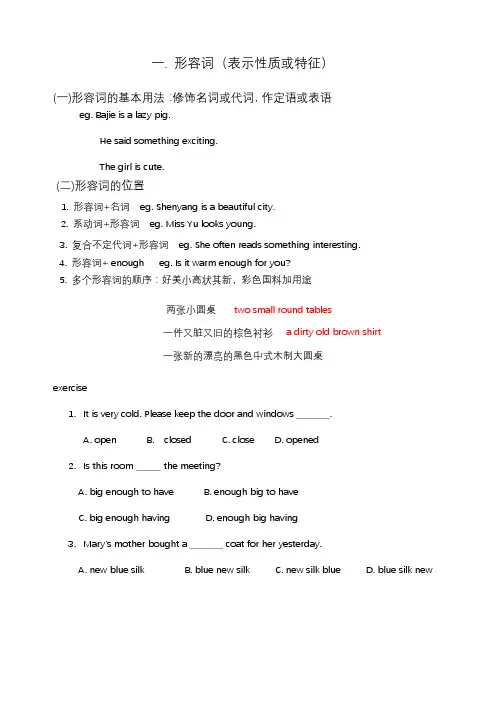
eg. Bajie is a lazy pig. He said something exciting. The girl is cute. 一. 形容词(表示性质或特征) (一)形容词的基本用法:修饰名词或代词,作定语或表语 1. 形容词+名词 eg. Shenyang is a beautiful city. 2. 系动词+形容词 eg. Miss Yu looks young. 3. 复合不定代词+形容词 eg. She often reads something interesting. 4. 形容词+ enough eg. Is it warm enough for you? 5. 多个形容词的顺序:好美小高状其新,彩色国料加用途 两张小圆桌 一件又脏又旧的棕色衬衫 two small round tables a dirty old brown shirt 一张新的漂亮的黑色中式木制大圆桌 (二)形容词的位置 exercise 1. It is very cold. Please keep the door and windows ________. A. open B. closed C. close D. opened 2. Is this room ______ the meeting? A. big enough to have B. enough big to have C. big enough having D. enough big having 3. Mary ’s mother bought a ________ coat for her yesterday. A. new blue silk B. blue new silk C. new silk blue D. blue silk new(三)形容词的构成1. 名词变形容词2. 复合形容词由“数词+名词”构成的复合形容词中,名词要用单数形式,且数词和名词之间要用连字符。
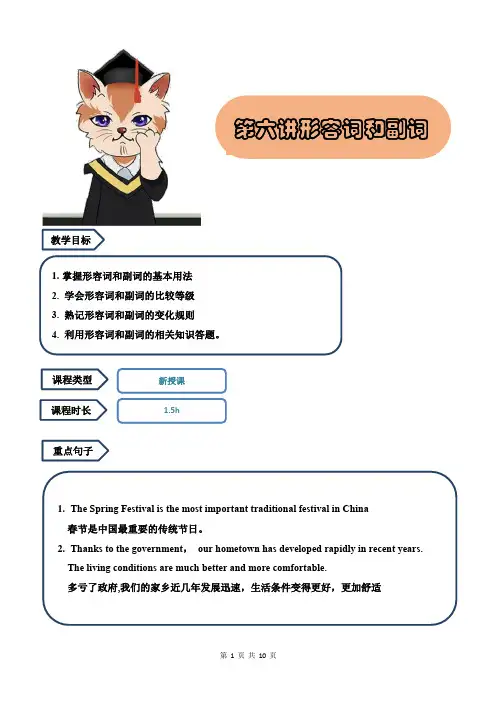
第六讲形容词和副词教学目标1.掌握形容词和副词的基本用法2. 学会形容词和副词的比较等级3. 熟记形容词和副词的变化规则4. 利用形容词和副词的相关知识答题。
课程类型新授课课程时长 1.5h重点句子1.The Spring Festival is the most important traditional festival in China春节是中国最重要的传统节日。
2.Thanks to the government,our hometown has developed rapidly in recent years.The living conditions are much better and more comfortable.多亏了政府,我们的家乡近几年发展迅速,生活条件变得更好,更加舒适课堂导入Heavy Heavier The heaviestThe pig is heavy .The lion is heavier than the pig.The elephant is the heaviest of the three.考点一形容词和副词的基本用法[拓展] 形容词的其他用法(1)“the+形容词”表示一类人或物,如:the old 老人。
(2)形容词常用句式:①“It's+adj.+for+sb.+to do sth.” 表示“做某事对某人来说是……的”。
在这一句型中,常用描述事物性质的形容词,如: easy, difficult, important, dangerous等。
例:It is important for us ________ (work) hard.①“It's+adj.+of+sb.+to do sth.” 表示“某人做某事是……的”。
在这一句型中,常用描述行为者的性格、品质的形容词.如: good, kind, nice, polite, clever, foolish, lazy, careful等。
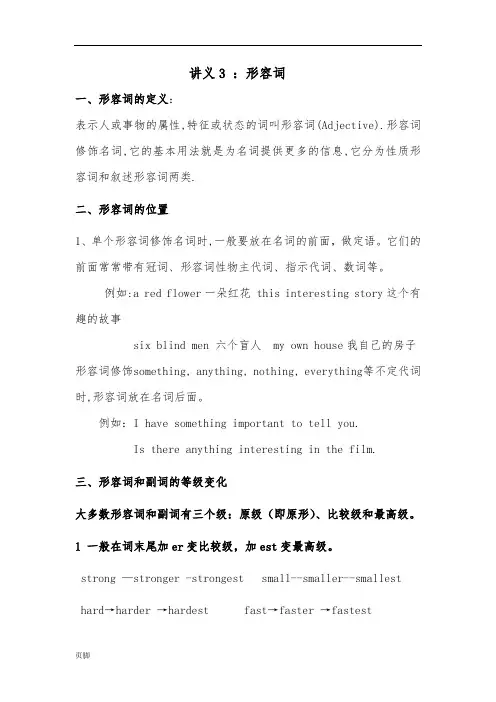
讲义3 :形容词一、形容词的定义:表示人或事物的属性,特征或状态的词叫形容词(Adjective).形容词修饰名词,它的基本用法就是为名词提供更多的信息,它分为性质形容词和叙述形容词两类.二、形容词的位置1、单个形容词修饰名词时,一般要放在名词的前面,做定语。
它们的前面常常带有冠词、形容词性物主代词、指示代词、数词等。
例如:a red flower一朵红花 this interesting story这个有趣的故事six blind men 六个盲人 my own house我自己的房子形容词修饰something, anything, nothing, everything等不定代词时,形容词放在名词后面。
例如:I have something important to tell you.Is there anything interesting in the film.三、形容词和副词的等级变化大多数形容词和副词有三个级:原级(即原形)、比较级和最高级。
1 一般在词末尾加er变比较级,加est变最高级。
strong —stronger -strongest small--smaller--smallest hard→harder →hardest fast→faster →fastest2 如果以e结尾,只加r 或st。
nice--nicer--nicest fine--finer--finest3 以重读闭音节,末尾只有一个辅音字母,须先双写这个辅音字母,再加er或est。
sad--sadder-- saddest big--bigger--biggest hot--hotter --hottest4 以辅音字母加y结尾的词,把y变成i,再加er或est。
angry--angrier-angriest early→earlier →earliest hungry-hungrier-hungriest5、但是,开放类副词即形容词加ly结尾变成的副词加more或most.如quickly →more quickly →most quickly quietly →more quietly →most quietlyslowly—more slowly—most slowly[注]:early中的ly不是后缀,故把y变i再加er和est6、大部分双音节和所有多音节词都在其前面加more变比较级,加most变最高级different -more different -most differentbeautiful--more beautiful--the most beautifulexpensive--more expensive--the most expensive但是,以形容前缀un结尾的三音节形容词不适合上述情况,如unhappy,untidy,我们可以说:unhappier→u nhappiest,形容词比较级和最高级的不规则变化四.形容词副词的用法1."the+形容词",表示一类人或事物,相当于名词,用作主语及宾语The old often think of old things.2 "The+形容词比较级..., the+形容词比较级..."表示 " 越... 就越..."。

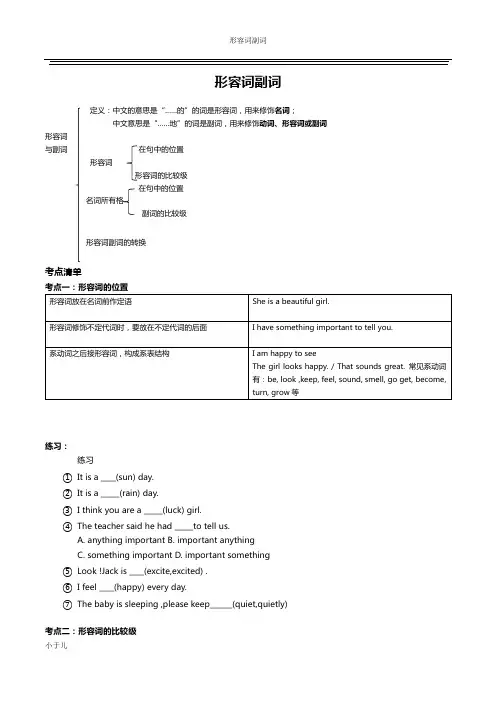
形容词副词定义:中文的意思是“……的”的词是形容词,用来修饰名词;中文意思是“……地”的词是副词,用来修饰动词、形容词或副词形容词与副词在句中的位置形容词形容词的比较级在句中的位置名词所有格副词的比较级形容词副词的转换考点清单练习:练习① It is a ____(sun) day. ② It is a _____(rain) day.③ I think you are a _____(luck) girl. ④ The teacher said he had _____to tell us.A. anything importantB. important anythingC. something importantD. important something⑤ Look !Jack is ____(excite,excited) . ⑥ I feel ____(happy) every day.⑦ The baby is sleeping ,please keep______(quiet,quietly)考点二:形容词的比较级1.规则的形容词比较级(1)在形容词词尾加上“er”“est”构成比较级、最高级:bright(明亮的)—brighter—brightest broad(广阔的)—broader—broadest cheap(便宜的)—cheaper—cheapest clean(干净的)—cleaner—cleanest clever(聪明的)—cleverer—cleverest cold(寒冷的)—colder—coldestcool(凉的)—cooler—coolest dark(黑暗的)—darker—darkest dear(贵的)—dearer—dearest deep(深的)—deeper—deepestfast(迅速的)—faster—fastest few(少的)—fewer—fewestgreat(伟大的)—greater—greatest hard(困难的,硬的)—harder—hardest high(高的)—higher—highest kind(善良的)—kinder—kindestlight(轻的)—lighter—lightest long(长的)—longer—longestloud(响亮的)—louder—loudest low(低的)—lower—lowestnear(近的)—nearer—nearest new(新的)—newer—newestpoor(穷的)—poorer—poorest quick(快的)—quicker—quickest quiet(安静的)—quieter—quietest rich(富裕的)—richer—richestshort(短的)—shorter—shortest slow(慢的)—slower—slowestsmall(小的)—smaller—smallest smart(聪明的)—smarter—smartest soft(柔软的)—softer—softest strong(强壮的)—stronger—strongest sweet(甜的)—sweeter—sweetest tall(高的)-taller-tallestthick(厚的)—thicker—thickest warm(温暖的)—warmer—warmest weak(弱的)—weaker—weakest young(年轻的)—younger—youngest (2).双写最后一个字母,再加上“er”“est”构成比较级、最高级:big(大的)—bigger—biggest fat(胖的)—fatter—fattesthot(热的)—hotter—hottest red(红的)—redder—reddestsad(伤心的)—sadder—saddest thin(瘦的)—thinner—thinnestwet(湿的)—wetter—wettest mad(疯的)—madder—maddest(3).以不发音的字母e结尾的形容词,加上“r”“st”构成比较级、最高级:able(能干的)—abler—ablest brave(勇敢的)—braver—bravest close(接近的)—closer—closest fine(好的,完美的)—finer—finestlarge(巨大的)—larger—largest late(迟的)—later—latestnice(好的)—nicer—nicest ripe(成熟的)—riper—ripestrude(粗鲁的)—ruder—rudest safe(安全的)—safer—safeststrange(奇怪的)—stranger—strangest wide(宽广的)—wider—widestwise(睿智的,聪明的)—wiser—wisest white(白的)—whiter—whitest(4).以字母y结尾的形容词,把y改为i,再加上“er”“est”构成比较级、最高级:busy(忙碌的)—busier—busiest dirty(脏的)—dirtier—dirtiestdry(干燥的)—drier—driest early(早的)—earlier—earliesteasy(容易的)—easier—easiest friendly(友好的)—friendlier—friendliest funny(好玩的)—funnier—funniest happy(开心的)—happier—happiest healthy(健康的)—healthier—healthiest heavy(重的)—heavier—heaviesthungry(饿的)—hungrier—hungriest lazy(懒惰的)—lazier—laziestlucky(幸运的)—luckier—luckiest naughty(调皮的)—naughtier—naughtiest noisy(嘈杂的)—noisier—noisiest pretty(美丽的)—prettier—prettiestsilly(傻的)—sillier—silliest spicy(辣的)—spicier—spiciestthirsty(渴的)—thirstier—thirstiest ugly(丑的)—uglier—ugliest(5).双音节、多音节形容词,在单词前面加上“more”“most”构成比较级、最高级:afraid(害怕的)—more afraid—most afraidbeautiful(美丽的)—more beautiful—most beautifulcareful(仔细的)—more careful—most carefulcheerful(开心的)—more cheerful—most cheerfulcrowded(拥挤的)—more crowded—most crowdeddangerous(危险的)—more dangerous—most dangerousdelicious(美味的)—more delicious—most deliciousdifficult(困难的)—more difficult—most difficultexciting(令人兴奋的)—more exciting—most excitingexpensive(昂贵的)—more expensive—most expensivefamous(著名的)—more famous—most famousfrightened(受惊的)—more frightened—most frightenedfrightening(令人害怕的)—more frightening—most frighteninghard-working(勤奋的)—more hard-working—most hard-workinghelpful(有帮助的)—more helpful—most helpfulhonest(诚实的)—more honest—most honestimportant(重要的)—more important—most importantinteresting(有趣的)—more interesting—most interestingpolite(有礼貌的)—more polite—most politeterrible(可怕的)—more terrible—most terribletired(累的)—more tired—most tired(6).不规则变化的形容词:bad(坏的)—worse—worst far(远的)—farther—farthest (far—further—furthest)good(好的)—better—best ill(病的)—worse—worstlittle(少的)—less—least many(多的)—more—most much(多的)—more—most old(年老的)—older—oldest ( old—elder—eldest) well(好的,身体好的)—better—best练习1. Is your friend ____ (young) than you ?2. Shanghai is one of ______ (big) cities in the world.3. Do you think English is _____important than maths。
形容词和副词一.形容词12.sun—sunny, rain—rainy, wind—windy, cloud—cloudy, interest—interesting, friend—friendly, care—careful, use—useful3. 做定语的多个形容词如何排列?遵行下列原则:限定词+描绘性形容词+“大型(形)新式(色)国产材料”+名词。
其中“大型(形)新式(色)国产材料”中的“大”表示大小,长短,高低,年龄的形容词,“型(形)”表示形状的形容词,“新”指表示新旧的形容词,“式(色)”表示颜色的形容词,“国产”表示国籍,地区,出处的形容词,“材料”表示物质材料的形容词。
如:a beautiful big round black Russian wood desk.[试一试]:Mr. Smith has a _________________car. (French, long, red)二、副词1.2.形容词到副词的转化(1) 有许多副词是对应的形容词加ly构成, 如: Strong-strongly, real-really(2) 词尾是y的要把y变为i再加ly, 如:busy—busily, happy--happily(3) 以e结尾的,大部分直接加-ly, 如:wide--widely , brave--bravely(4) 有几个特殊的要去e后再加-ly或y, 如:true –truly terrible --terribly[注意]:good的副词是well. hard 既是形容词也是副词,作形容词是“困难的”,作副词是“努力地,猛烈地”。
hardly的意思是“几乎不”它和hard没关系三.形容词和副词的比较级和最高级4.使用形容词比较级时(1)在形容词比较级前可用much, even ,still ,a little, a bit, far, a lot来修饰,表示程度。
一. 形容词、副词的比较级和最高级一.形容词、副词的级:原级,比较级,最高级二.形容词、副词三个级的用法:1.原级比较,和……一样as +原级+as (否定:not so/as …as)eg. They run quite fast. 他们跑得相当快。
Jimmy is as tall as his father. 吉姆和他的爸爸一样高。
He studies as hard as his brother. 他和他哥哥学习一样努力。
2.二者比较时(用比较级),比较级+thaneg. Helen is taller than me/I (am). 海伦比我高。
She runs faster than he (does). 她跑得比他快。
3.the+最高级+(名词)+范围,表示在……中是最……的eg. The dress is the largest in the shop. 这条裙子是店里最大的。
He runs (the) fastest in our class.■不规则变化:两多两好三不好,一老一远加一少(最高级前要用the,副词最高级前面可省略)四.比较级的其他句型结构1. 表示两者之间的选择,可使用“Which/Who+ 谓语动词+比较级, …or …?●Which one is ______________, this one or that one?A. goodB. badC. bestD. worseeg. Which T-shirt is nicer, this one or that one?2. 比较级+and+比较级或more and more +原级,表示越来越……eg. It becomes warmer and warmer when spring comes.It is getting cooler and cooler.Our school is becoming more and more beautiful.● The weather is becoming ______________.A. hotter and hotterB. more hot and hotC. hoter and hoterD. more and more hot● I like Meishan ___________ because it is becoming __________.A. well; beautifulB. better; more and more beautifulC. well; more and more beautifulD. better; beautiful and beautiful●—I talked with my little uncle on the computer last night.--The internet makes the world _________________.A. small and smallB. smaller and smallerC. small and smallerD. smaller and small3. the+比较级,the+比较级,越……,越……eg. The more we get, the happier we feel.The sooner, the better.The harder you work, the better grades you’ll get.● ___________ you’re, __________ mistakes you’ll make.A. The careful, the lessB. The more careful, the lessC. The more carefully, the fewerD. The more careful, the fewer●–The more you practice, ___________ your English will be.-- I agree. Practice makes perfect.A. the betterB. the worseC. moreD. less4.the+比较级+of,表示两者之间较……的一个eg. Nancy and Lucy are twins. In some way they look the same, but Nancy is the taller of the two.5. 比较级+than+ any+ other+名词(单数),表示比其他任何的……都……(比较级的形式表示最高级的含义)eg. He is taller than any other student in his class.=He is the tallest student in his class.他比他班上的任何一个学生都高。
形容词和副词(一)形容词的基本功能及其在句子中的位置说明人或事物的特征、性质或状态,常用来修饰名词或不定代词的词叫形容词。
1.形容词作定语,放在名词之前,不定代词之后。
e.g。
The beautiful girl is my sister。
那个漂亮的女孩是我的妹妹。
I have something important to tell you。
我有重要的事情要告诉你。
2.作表语,放在系动词之后.e。
g。
Our school is big and clean。
我们的学校又大又干净。
I felt terrible this morning。
我今天早上感到不舒服。
3.作宾语补足语,放在宾语之后。
e。
g.You must keep your eyes closed.你必须闭上眼睛。
I find it hard to travel around the big city.我发现在这个大城市旅行很难。
4.某些形容词放在定冠词之后,变成名词,表示一类人。
常见词有good/bad,rich/poor,young/old,deaf/blind,black/white,living/dead等。
e.g。
The rich should help the poor.富人应该帮助穷人。
The young should be polite to the old。
年轻人应该对老年人有礼貌。
(二)形容词比较等级的构成:原级、比较级和最高级规则变化不规则变化(三)形容词原级用法1.说明人或事物自身的特征、性质和状态时用形容词原级.The boy is too young。
这男孩太小了Math is very difficult.数学很难。
3.表示A与B在某一方面程度相同或不同时用形容词原级。
(1)肯定句中的结构:“A…+as+形容词原级+as+B”e。
g.English is as interesting as Chinese。
英语和语文一样有趣.Xiao Ming is as tall as Jim。
形容词副词定义:中文的意思是“……的”的词是形容词,用来修饰名词;中文意思是“……地”的词是副词,用来修饰动词、形容词或副词形容词与副词在句中的位置形容词形容词的比较级在句中的位置名词所有格 副词的比较级形容词副词的转换考点清单练习:练习① It is a ____(sun) day. ② It is a _____(rain) day.③ I think you are a _____(luck) girl. ④ The teacher said he had _____to tell us.A. anything importantB. important anythingC. something importantD. important something⑤ Look !Jack is ____(excite,excited) . ⑥ I feel ____(happy) every day.⑦ The baby is sleeping ,please keep______(quiet,quietly)考点二:形容词的比较级(1)在形容词词尾加上“er”“est”构成比较级、最高级:bright(明亮的)—brighter—brightest broad(广阔的)—broader—broadest cheap(便宜的)—cheaper—cheapest clean(干净的)—cleaner—cleanest clever(聪明的)—cleverer—cleverest cold(寒冷的)—colder—coldestcool(凉的)—cooler—coolest dark(黑暗的)—darker—darkest dear(贵的)—dearer—dearest deep(深的)—deeper—deepestfast(迅速的)—faster—fastest few(少的)—fewer—fewestgreat(伟大的)—greater—greatest hard(困难的,硬的)—harder—hardest high(高的)—higher—highest kind(善良的)—kinder—kindestlight(轻的)—lighter—lightest long(长的)—longer—longestloud(响亮的)—louder—loudest low(低的)—lower—lowestnear(近的)—nearer—nearest new(新的)—newer—newestpoor(穷的)—poorer—poorest quick(快的)—quicker—quickest quiet(安静的)—quieter—quietest rich(富裕的)—richer—richestshort(短的)—shorter—shortest slow(慢的)—slower—slowestsmall(小的)—smaller—smallest smart(聪明的)—smarter—smartest soft(柔软的)—softer—softest strong(强壮的)—stronger—strongest sweet(甜的)—sweeter—sweetest tall(高的)-taller-tallestthick(厚的)—thicker—thickest warm(温暖的)—warmer—warmest weak(弱的)—weaker—weakest young(年轻的)—younger—youngest (2).双写最后一个字母,再加上“er”“est”构成比较级、最高级:big(大的)—bigger—biggest fat(胖的)—fatter—fattesthot(热的)—hotter—hottest red(红的)—redder—reddestsad(伤心的)—sadder—saddest thin(瘦的)—thinner—thinnestwet(湿的)—wetter—wettest mad(疯的)—madder—maddest(3).以不发音的字母e结尾的形容词,加上“r”“st”构成比较级、最高级:able(能干的)—abler—ablest brave(勇敢的)—braver—bravest close(接近的)—closer—closest fine(好的,完美的)—finer—finest large(巨大的)—larger—largest late(迟的)—later—latestnice(好的)—nicer—nicest ripe(成熟的)—riper—ripestrude(粗鲁的)—ruder—rudest safe(安全的)—safer—safeststrange(奇怪的)—stranger—strangest wide(宽广的)—wider—widestwise(睿智的,聪明的)—wiser—wisest white(白的)—whiter—whitest(4).以字母y结尾的形容词,把y改为i,再加上“er”“est”构成比较级、最高级:busy(忙碌的)—busier—busiest dirty(脏的)—dirtier—dirtiestdry(干燥的)—drier—driest early(早的)—earlier—earliesteasy(容易的)—easier—easiest friendly(友好的)—friendlier—friendliest funny(好玩的)—funnier—funniest happy(开心的)—happier—happiest healthy(健康的)—healthier—healthiest heavy(重的)—heavier—heaviesthungry(饿的)—hungrier—hungriest lazy(懒惰的)—lazier—laziestlucky(幸运的)—luckier—luckiest naughty(调皮的)—naughtier—naughtiest noisy(嘈杂的)—noisier—noisiest pretty(美丽的)—prettier—prettiestsilly(傻的)—sillier—silliest spicy(辣的)—spicier—spiciestthirsty(渴的)—thirstier—thirstiest ugly(丑的)—uglier—ugliest(5).双音节、多音节形容词,在单词前面加上“more”“most”构成比较级、最高级:afraid(害怕的)—more afraid—most afraidbeautiful(美丽的)—more beautiful—most beautifulcareful(仔细的)—more careful—most carefulcheerful(开心的)—more cheerful—most cheerfulcrowded(拥挤的)—more crowded—most crowdeddangerous(危险的)—more dangerous—most dangerousdelicious(美味的)—more delicious—most deliciousdifficult(困难的)—more difficult—most difficultexciting(令人兴奋的)—more exciting—most excitingexpensive(昂贵的)—more expensive—most expensivefamous(著名的)—more famous—most famousfrightened(受惊的)—more frightened—most frightenedfrightening(令人害怕的)—more frightening—most frighteninghard-working(勤奋的)—more hard-working—most hard-workinghelpful(有帮助的)—more helpful—most helpfulhonest(诚实的)—more honest—most honestimportant(重要的)—more important—most importantinteresting(有趣的)—more interesting—most interestingpolite(有礼貌的)—more polite—most politeterrible(可怕的)—more terrible—most terribletired(累的)—more tired—most tired(6).不规则变化的形容词:bad(坏的)—worse—worst far(远的)—farther—farthest (far—further—furthest) good(好的)—better—best ill(病的)—worse—worstlittle(少的)—less—least many(多的)—more—most much(多的)—more—most old(年老的)—older—oldest ( old—elder—eldest) well(好的,身体好的)—better—best练习1. Is your friend ____ (young) than you ?2. Shanghai is one of ______ (big) cities in the world.3. Do you think English is _____important than maths。
本代主要介绍形容词和副词的用法,包含形容词的语法功能,形容词的比较等级,副词的分类,副词的语法功能等内容后面带有练习题内容很多,知识点也比较齐全一、概述形容词和副词都是起修饰作用的词类,两者的区别之一就在于它们所修饰的对象不同。
形容词主要用来说明或修饰名词或代词,描述名词或代词所代表人或事物的性质,增加或补充其含意,从而限制或缩小其适用范围。
副词的主要功能是修饰动词,形容词或其它副词有时也可以修饰全句。
Boris has brains. In fact,I doubt whether any one in the class has a higher IQ. 保利斯有头脑。
事实上,我怀疑班上是否有人比他智商高。
(形容词修饰名词)二、形容词1、形容词的定义形容词用来修饰和形容名词,表示名词的属性,补充说明它的意思。
a big house 一幢大房子 a new bicycle一辆新自行车2、形容词的语法功能形容词修饰名词或不定代词,表示人或事物的性质、特征或状态,在句子中主要用作定语、表语、补足语、状语等。
(1)作定语①前置定语a.形容词作定语一般需放在它所修饰的名词之前并尽量靠近被修饰的词。
在这种位置上的定语叫前置定语。
语序一般为“冠词(或其他限定词)+形容词+名词”。
He is an honest boy.他是个诚实的孩子。
b.若有多个形容修饰名词,它们的位置要由它们与被修饰词的密切程度来决定。
关系最密切的形容词靠近被修饰词,而关系较远的离被修饰词则相对较远。
其排列顺序通常是:限定词+描绘性形容词+颜色+国籍、地区+用途、类别+名词。
the happy and healthy children幸福而健康的孩子们-It was great. We vis it ed some friends, and spent the last few sunny days at the seaside.很好。
形容词和副词(一)形容词的基本功能及其在句子中的位置说明人或事物的特征、性质或状态,常用来修饰名词或不定代词的词叫形容词。
1.形容词作定语,放在名词之前,不定代词之后。
e.g.The beautiful girl is my sister.那个漂亮的女孩是我的妹妹。
I have something important to tell you.我有重要的事情要告诉你。
2.作表语,放在系动词之后。
e.g.Our school is big and clean.我们的学校又大又干净。
I felt terrible this morning.我今天早上感到不舒服。
3.作宾语补足语,放在宾语之后。
e.g.You must keep your eyes closed.你必须闭上眼睛。
I find it hard to travel around the big city.我发现在这个大城市旅行很难。
4.某些形容词放在定冠词之后,变成名词,表示一类人。
常见词有good/bad,rich/poor,young/old,deaf/blind,black/white,living/dead等。
e.g.The rich should help the poor.富人应该帮助穷人。
The young should be polite to the old.年轻人应该对老年人有礼貌。
(二)形容词比较等级的构成:原级、比较级和最高级规则变化不规则变化(三)形容词原级用法1.说明人或事物自身的特征、性质和状态时用形容词原级。
The boy is too young.Math is very difficult.数学很难。
3.表示A与B在某一方面程度相同或不同时用形容词原级。
(1)肯定句中的结构:“A…+as+形容词原级+as+B”e.g.English is as interesting as Chinese.英语和语文一样有趣。
Xiao Ming is as tall as Jim.小明和吉姆一样高。
(2)否定句中的结构:“A…+as/so+形容词原级+as+B”e.g.This book isn’t as new as that one.这本书不如那本书新。
I am not so careful as Lucy.我没有露西仔细。
(3)表示“A是B的……倍”时,用“A…+倍数+as+形容词原级+as+B”结构。
(一次:once,两次:twice,三次以上:数字+times)e.g.Our school is three times as big as theirs.我们学校是他们学校的三倍。
This table is twice as long as that one.这张桌子是那张桌子的两倍长。
(四)形容词比较级用法1.表示两者进行比较时用形容词比较级,最明显的提示词是than,其结构为“A…+比较级+than+B”。
e.g.Li Lei’s room is bigger than mine.李雷的房间比我的大。
This mooncake is nicer than that one.这块月饼比那块好吃。
注意:为了避免重复,在从句中常用the one,that,those等词来替代前面出现过的名词。
其中the one替代可数名词单数形式,the ones或those替代可数名词复数形式,that替代不可数名词。
e.g.The weather in Beijing is colder than that in Guangzhou in winter.北京的天气比广州的天气冷。
2.有表示程度的副词a little,a bit,a few,a lot,much,even,still,far,rather,any等修饰时,用形容词比较级。
e.g.I feel even worse now.我现在觉得更难受了。
It is much colder today than before.今天比以前冷得多。
3.表示两者之间进行选择“哪一个更……”时,用句型“Whi ch/Who is+形容词比较级,A or B?”表示。
e.g.Who is taller, Li Ming or Wang Tao?李明和王涛哪一个高一些?Which sweater is more beautiful, the yellow one or the pink one?哪一件毛衣更漂亮,黄色还是粉红色的?4.表示“几倍于……”时,用“倍数+比较级+than”表示。
e.g.I am three years older than you.我比你大三岁。
5.表示“两者之间最……一个(o f the two)”时,常用“the+比较级”结构。
e.g.Mary is the taller of the twins. Mary是双胞胎中的高个子。
6.表示“越来越……”,用比较级重叠结构,即“比较级+and+比较级”,多音节词和部分双音节词时用“more and more+形容词原级”。
e.g.It’s getting warmer and warmer in spring.春天天气变得越来越暖和。
Our hometown is becoming more and more beautiful.我们的家乡越来越漂亮了。
7.表示“越……就越……”时,用“the+比较级,the+比较级”结构。
e.g.The more we get together, the happier we’ll be.我们越是在一起,就越开心。
(五)形容词最高级用法1.表示三者或三者以上的人或物进行比较时,用最高级形式。
形容词最高级前必须加定冠词the,句末常跟一个in/of短语来表示范围。
e.g.He is the strongest of the three boys.在三个男孩子中,他是最强壮的。
Shanghai is the biggest city in China.上海是中国最大的城市。
2.表示在三者或三者以上的人或物进行选择时,用“Which/Who is+the+最高级,A,B or C?”结构。
e.g.Which city is the most beautiful, Beijing, Shanghai or Fuzhou?哪个城市最漂亮,北京,上海还是福州?3.表示“最……的……之一”时,用“one of the+形容词最高级”结构,该形容词后面的名词要用复数形式。
e.g.Zhou Jielun is one of the most popular singers.周杰伦是最受欢迎的歌星之一。
4.形容词最高级前面可以加序数词,表示“第几最……”。
e.g.The Changjiang River is the first longest river in China. 长江是中国第一大长河。
5.形容词最高级前面可以有物主代词,指示代词,名词所有格等修饰,但此时不能再用定冠词the。
e.g.This is our last lesson today.这是我们今天的最后一节课。
e.g.Li Lei is the tallest student in his class.李雷是班上最高的学生。
=Li Lei is taller than any other student in his class.李雷比班上其他任何一个学生都高。
=Li Lei is taller than the other students in his class.李雷比班上其他所有的学生都高。
=Li Lei is taller than anyone else in his class.李雷比班上其他任何人都高。
(六)使用形容词时易混知识牢记下列结构:比较级+than+any other+单数名词all (the) other+复数名词any one/anybody else any of the other+复数名词the rest of+复数名词或不可数名词注意:在同一范围内进行比较时,必须把主体排除在被比较的范围之外。
e.g.China is larger than any other country in Asia.中国比亚洲其他任何一个国家都大。
(同一范围内,只能和其他对象进行比较)China is larger than any country in Africa. 中国比非洲的任何一个国家都大。
(不同范围内,可以和其他任意一个对象进行比较)3.在两者进行比较“表示A不如B”时,多音节和部分双音节形容词除使用“not…as/so+形容词原级+as”结构外,还可使用“less+形容词原级+than”结构。
e.g.I am not as careful as Lily. 我没有Lily仔细。
=I am less careful than Lily.4.许多形容词加-ly可以构成副词,但有些-ly结尾的词不是副词,而是形容词。
friendly(友好的)lonely(孤独的,孤单的)lovely(可爱的,有趣的)likely(有希望的)daily(日常的)lively(有生气的,活泼的)上面我们复习了形容词,下面我们复习副词,副词分为“①时间副词,如yesterday(昨天);②地点副词,如inside(在里面);③方式副词,如quickly(快地);④程度副词,如very(很);⑤疑问副词,如when(什么时候);⑥关系副词,如why(为什么)。
关系副词用来引导定语从句。
有些知识如时间、地点,是非常明显的东西,只需要提一下。
今天我们主要复习以下几个方面:副词用法(一)副词是用来说明时间、地点、程度、方式等概念的词,主要修饰动词、形容词、其他副词或整个句子。
1.作状语,用来修饰动词、形容词、其他副词和句子。
e.g.Please listen to me carefully. 请你认真地听我讲。
The boy is too young. 这男孩太小了。
e.g.My father will be back in a week. 我父亲一周后回来。
3.作宾语补足语。
e.g.Let him in, please. 请让他进来。
(二)副词的位置1.一般作状语时放在谓语动词之后。
如果谓语动词带有宾语,副词则放在宾语后面。
e.g.We all study hard.我们努力学习。
He is always late for school.I often go to see my grandparents on Sunday. 我经常星期天去看望祖父母。
3.某些副词是为了强调上下句的衔接,放在句子之前。